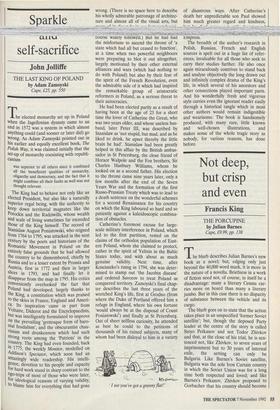self-sacrifice
Sparkle
C.1.11A-1 John Jolliffe
THE LAST KING OF POLAND by Adam Zamoysld Cape, £25, pp. 550 he elected monarchy set up in Poland When the Jagellonian dynasty came to an end in 1572 was a system in which almost anything could (and sooner or later did) go wrong. As Adam Zamoyski pointed out in his earlier and equally excellent book, The Polish Way, it was claimed initially that the set-up of monarchy coexisting with republi- canism
was superior to all others since it combined all the beneficent qualities of monarchy, oligarchy and democracy, and the fact that it might combine all their faults as well was not thought relevant.
The King had to behave not only like an elected President, but also like a naturally superior regal being, with the authority to keep down territorial magnates like the Potockis and the Radziwills, whose wealth and scale of living sometimes far exceeded those of the King himself. The record of Stanislaw August Poniatowsld, who reigned from 1764 to 1795, was attacked in the next century by the poets and historians of the Romantic Movement in Poland on the entirely false grounds that he had allowed the country to be dismembered, chiefly by Russia and to a lesser extent by Prussia and Austria, first in 1772 and then in larger Slices in 1793, and had finally let it disappear from the map in 1795. His critics conveniently overlooked the fact that Poland had developed, largely thanks to the King, a constitution which was praised to the skies in France, England and Ameri- ca. Its inspiration came in part from Voltaire, Diderot and the Encyclopaedists, but was intelligently formulated to improve ofl the prevailing 'grotesque form of baro- nial feudalism', and the obscurantist chau- vinism and drunkenness which had such strong roots among the 'Patriots' in the country. The King had even founded, back In 1775, the weekly Monitor, modelled on Addison's Spectator, which soon had an amazingly wide readership. His intelli- gence, devotion to his people and capacity for hard work stand in sharp contrast to the ego-trips of most of those who were later, for ideological reasons of varying validity, to blame him for everything that had gone course wiciely followed.) But he had had the misfortune to ascend the throne of 'a state which had all but ceased to function', at a time when two powerful neighbours were preparing to blot it out altogether, largely motivated by their other external alliances and wars (which had nothing to do with Poland) but also by their fear of the spirit of the French Revolution, even the admirable side of it which had inspired the remarkable group of aristocratic reformers in Poland, as a serious threat to their autocracies.
He had been elected partly as a result of having been at the age of 23 for a short time the lover of Catherine the Great, who was two years older, and whose useless hus- band, later Peter III, was described by Stanislaw as 'not stupid, but mad, and as he liked to drink, he upset thereby the little brain he had'. Stanislaw had been greatly helped in this affair by the British ambas- sador in St Petersburg, the close friend of Horace Walpole and the Fox brothers, Sir Charles Hanbury Williams, whom he looked on as a second father. His election to the throne came nine years later, only a few months after the end of the Seven Years War and the formation of the first Russo-Prussian Treaty which was to lead to a death sentence on the wonderful schemes for a second Renaissance for his country on which the King laboured so hard and so patiently against a kaleidoscopic combina- tion of obstacles.
Catherine's foremost excuse for large- scale military interference in Poland, which led to the first partition, rested on the claims of the orthodox population of East- ern Poland, whom she claimed to protect, rather in the spirit of Yeltsin in the Baltic States today, and with about as much genuine validity. Next time, after Kosciuszko's rising in 1794, she was deter- mined to stamp out 'the Jacobin disease' and ordered Suvorov to treat Poland as conquered territory. Zamoysld's final chap- ter describes the last three years of the wretched King's life, first at Grodno (from where the Duke of Portland offered him a refuge in England, where his own fortune 'would always be at the disposal of Count Poniatowski') and finally at St Petersburg. Out of sheer selfless curiosity, he attended as best he could to the petitions of thousands of his ruined subjects, many of whom had been disloyal to him in a variety 'I see you've got a granny flat!' hmpreis.
The breadth of the author's research in Polish, Russian, French and English sources is spelt out in a huge list of refer- ences, invaluable for all those who seek to carry their studies further. He also once again miraculously contrives to stand back and analyse objectively the long drawn out and infinitely complex drama of the King's life, in which several of his ancestors and other connections played important parts. And his wonderfully fresh and vigorous style carries even the ignorant reader easily through a historical tangle which in most other authors would remain indigestible and wearisome. The book is handsomely produced, with many rare, little known and well-chosen illustrations, and makes sense of the whole tragic story as nobody, for various reasons, has done before.










































































 Previous page
Previous page